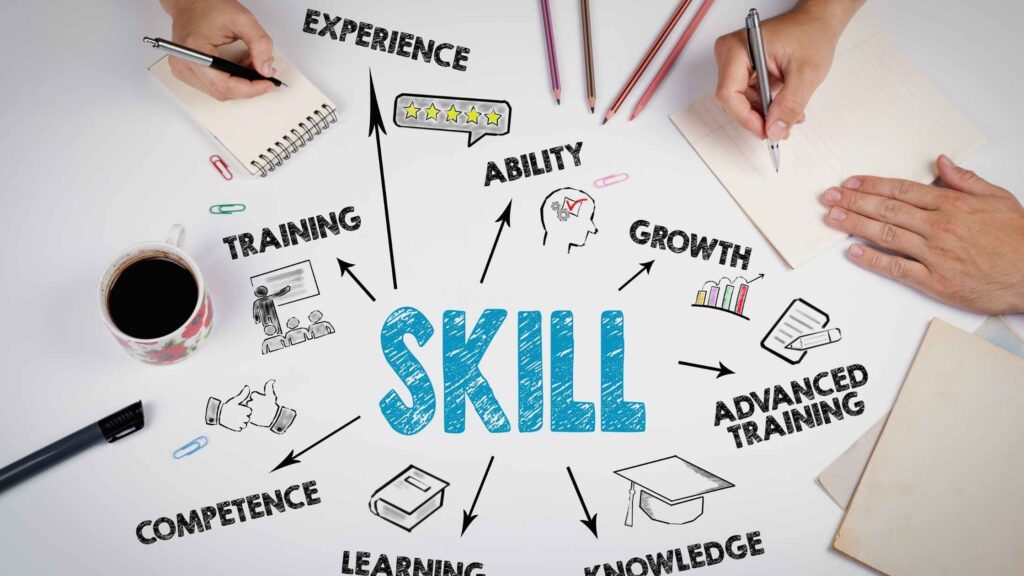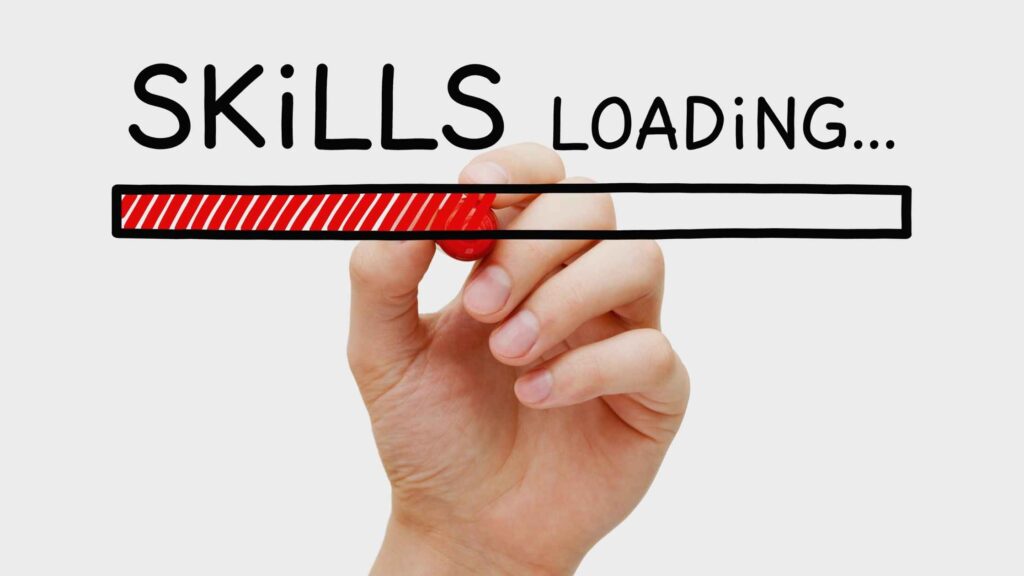
Closing a sale is not a piece of cake. A sales professional must have the right sales skills to connect with the consumer, relate to their story, and then persuade them to make the deal.
Whether you are about to launch a product, own a company, or intend to become part of the sales industry, you need to understand the core qualities of a sales professional. Implementing the skills in your job will make you an effective sales professional, or the understanding of the skills will allow you to train your staff with a strategy to increase sales.
It requires patience to become good at, but it can be a very rewarding career if you find the right path.
What is meant by sales skills?
Sales skills is a combination of a salesperson’s character traits and hard skills they’ve learned over time. That’s what people mean when they talk about sales skills. In terms of priority, character traits are much more important because they can’t be taught like skills. Character traits forge over a lifetime of trial.
On the other hand, sales skills are the learned abilities that a sales professional will use to generate new business and close deals. Skills help create a smooth and successful buying experience for potential buyers. For example, a concise email will make it easier for prospects to understand and make a buying decision faster than an email that’s too big.
In short, sales skills are an amalgamation of techniques used by sales representatives to ensure a positive buying experience. The positive experience can then lead to customers referring to new customers, which plays a vital role in meeting the sales goal set by the company.
What are the sales skills?

There are a lot of skills you can learn to develop your career over time. These skills range from prioritization to time management, and memorizing the steps in your sales process.
Here’s a list of the top 9 sales skills:
1. Time Management
A key aspect of Sales Skills is time management. Time management leads to better accomplishment of goals. Some benefits of time management are:
Greater Productivity: A sales professional who manages their time well becomes more productive and can avoid forgetting crucial tasks.
Practical Task Completion: You’ll finish tasks faster using time management and good prioritization together.
Stay organized if you want to manage your time effectively. A well-organized schedule enables you to finish the assigned tasks or achieve the sales goals quicker.
2. Questioning
One of the vital sales skills is proper questioning. A sales representative or professional can control the conversation with a strong questioning strategy. When asked a question, peoplefeel compelled to answer, and asking the right questions can lead to valuable information. Additionally, questioning is a powerful way to determine if a lead is qualified and if you can help with their problems.
Here are the five different types of questions that you can use in sales questioning:
- Open questions
- Closed questions
- Permission questions
- Rhetorical questions
- Leading questions
3. Presentation
Presentation, used effectively, can accelerate the sales timeline and close deals faster. However, presentations are a double-edged sword, where they can also completely turn a buyer off. An example of this would be a salesperson asking some irrelevant questions and immediately jumping into a presentation. The buyer would quickly lose interest, and you’d lose the deal.
Tips for high-converting presentations:
- Keep it relevant. You spent time asking the buyer about their problems. Demonstrate how you’ll solve them.
- Make it easy to participate. Don’t go on an indefinite talking track and lose the lead. After you make a point, ask the buyer how they would implement your solution.
- Make it fun. Even big execs at fortune 500 companies are people. Do you know what people enjoy? Fun.
- Make it easy to understand. If you can break apart their complex problem into a solution that’s easy to understand, they’ll see how your solution will impact their lives and start emotionally buying into it.
4. Communication
The mastery of verbal and nonverbal communication is the key to improving sales.
There are five essential components of successful sales communication.
Let’s have a look at each one of them:
Self-confidence:
You want to leave a lasting impression with your message. You need confidence and self-assurance for this. Being assertive in a conversation and confident in delivering your message is the best way to communicate your message. Think about it this way; if you aren’t confident in your solution, why would a stranger be?
Genuineness:
Being inauthentic in a conversation is obvious to others. Being a phony with people makes people back away quickly. Hence, being genuine with your thoughts is essential. A prominent sales trainer, John Braun, says, “…because prospects can smell your commission breath. They know you’re putting your best interest before theirs.”
Open-Mindedness:
An open-minded person considers the perspectives and ideas of others and respects them. A sales representative must be open-minded with the communication so that people listen to him casually but with respect and genuineness. Ego and the desire to be right can get in the way of finding the best solution for everyone involved in the deal.
Empathy:
People all around the world want to be understood. If you can communicate with people in a way that shows you understand their pains, you will be able to come to a common ground. Overcoming challenges becomes much easier when humans understand each other and show empathy. Hence, a sales representative must be empathetic towards the customers.
Clarity:
The clarity of your message is one of the most crucial elements of successful communication in sales. If your message is not clear , nomatter how open-minded, empathetic, and genuine you are, you will not be able to spread your message. Hence, make sure that you are precise and know what you want the customer to understand.
5. Prospecting
In the sales process, prospecting plays a vital role. It is the process of identifying potential buyers, also known as prospects. Prospecting is done to convert prospects into ‘good-fit’ leads that are likely to turn into a sale. It involves creating a prospect list, coming up with an outreach strategy and then executing the strategy by calling, emailing, or using social media to reach out. Prospecting is typically supplementary to marketing initiatives, but can be used exclusively as well.
Here’s a list of methods for prospecting:
- Cold calling
- Leaving voicemail (automated or manual)
- Emailing (automated or manual)
- Direct mailing
- Social media outreach (i.e. LinkedIn)
Each method can be useful in reaching prospects for the first time. It’s important to find out where your ideal prospects are likely to be found and easiest to contact.
6. Discovery:
Discovery calls are arguably the most important in the sales process, since they allow the salesperson to identify what’s really bothering a lead. In discovering what’s really important to leads, it gives the salesperson an opportunity to connect with them and determine if they are a good fit for the solution.
7. Story Telling:
Customers get tired of boring essays and lengthy paragraphs. Stories can help build a connection with a lead or prospect, and help them understand how your solution might help them too. The art of storytelling takes the lead when it comes to connecting with the customer because stories allow you to deeply connect with your client emotionally. Your stories can be personal, or they can be success stories from previous clients; the important thing is to keep them relevant to the person you’re selling to.
8. Objection Handling:
Few to no sales close without any objections or queries. Object handling is a process in which a sales professional reacts or responds to the critique or objections made by the prospect. It’s important to acknowledge and understand the objection a lead is making instead of dismissing or explaining it away. Objections can come from a number of reasons regardless of the stage in your sales process.
Here are some of of the most common objections:
- Price: The lead will object on the price if the value of what you are selling seems low compared to the price. To increase the value, you can add in bonuses (i.e. 1:1 meetings, video courses, etc). Giving discounts should be your last resort since it devalues your product or service.
- Decision-Maker: The lead will say something like, “I’ll need to run this by [person].” Either they’re making up a reason to get off the call with you, or you didn’t properly qualify them beforehand. The way to get past this is to confirm that they can make the decision themselves, or make sure all decision-makers are with you during your main pitch.
- Delay: “I’ll need to think about it.” Leads might delay if they’re feeling overwhelmed. At this point, confirm that they think it’s a great deal, will solve their problems, trust you, and can get access to the money needed. If those three things are aligned, they need help making the decision. So help them.
9. Active Listening
Active listening is one of the critical sales skills needed for success in any sales role. Strong listeners make for better communicators. Show your customers that you are an active listener by being attentive and maintaining eye contact and an open body posture. You must also smile and nod when it is necessary. Active listening gives the customer the confidence that the sales professional understands the problem or what the customer is trying to say. It gives them the feeling of being heard.
How to learn Sales Skills?

Learning sales skills is a journey. Whether you’re learning sales for the first time, or getting back into it, you need to consistently practice every day. It’s one thing to read a book about sales, and another entirely to put the knowledge into practice with living breathing people on the other end of a phone line, or across from you in a meeting. It can be scary – objections and rejection is common in sales, but repetition makes it easier over time. While it can take a long time to become a master salesperson, it’s super fast to start.
Here are the 5 practical steps to learn sales skills:
- Learn
Before you can become an expert, you need to become a novice. That means looking up and reading resources with industry best practices. The sheer volume of resources can be hard to navigate, but there are some great books to get you started. Beyond that, attending training, listening to podcasts, and learning from courses can help you along the way.
- Practice
It’s critical to put what you learn into practice as soon as possible. It can be addicting to get stuck in the learning process because it’s much easier than practicing. Think about a time when you were in a class (like math), and the teacher demonstrates how to find the solution to a problem. You follow along and it feels like you could do it blindfolded. Then, they say, “Ok, your turn.” You put your pencil to paper, and your mind goes blank.
Good practice involved taking what you learn and applying it to your daily life. Sales skills are also good people skills. If you can practice on the job, that’s great, but you can also practice with strangers in a coffee shop, family, or friends. The important thing is to start.
- Learn some more
As you learn, you’ll find that the skills and steps become more automatic. If you’re working as a salesperson, you’ll see that your sales numbers are becoming more consistent. If you’re practicing on your own time, you’ll start to become more comfortable with friends, family, and even strangers. When it starts to feel easy, that’s when it’s time to keep learning.
Try learning more advanced or complicated processes and skills to add them to your toolkit. For example, once you are comfortable with emailing, calling, and chatting, try learning how to use video for better results. Similarly, you could learn about direct mail, handwritten notes, and great follow-up techniques too.
- Practice some more
Once you’ve learned some more advanced techniques, it’s time to keep practicing. Challenge yourself to get even more reps in over time. It can be tempting to procrastinate, make excuses, or move slowly, but it’s all up to you at the end of the day.
- Repeat
This is a non-stop process. Aim to continuously learn and practice over time, and you’ll become an unstoppable salesperson.
- (Bonus): Find a mentor
It’s not always possible, but if you can find a sales mentor, you’ll be able to develop your sales skills a lot faster. Unfortunately, good mentors can be hard to find. A good mentor is someone that, first-off, has the skills necessary to guide you. Secondly, they need to have your best interest in mind too.
When looking for a mentor, use some of the skills you’re practicing to discover their past experience. Ask questions like, “How did you become an expert and accomplish [unique accomplishment]?” The more genuinely engaged you are, the more likely they are to reciprocate. If they know their stuff, they should be able to answer with deep layers of specificity. When you’re confident that you’d love to learn from them, it’s time to sell yourself and ask if they would consider casual mentoring. If they agree to a small commitment, they’ll be more likely to do more and more over time. Just remember to return the favour (many times over if you can!).
What is your sales strength?
Sales strengths can vary from person to person. Some sales professionals may be better communicators; some may be better at strategizing, some may be better at emotional intelligence. Once a sales representative figures out a sales strength, they can flourish to achieve top-tier sales goals.
Some examples of sales strengths:
- High-volume organization
- Video selling
- Cold calling
What is a selling style?
Selling style is associated with a sales professional’s different characteristics and how you utilize them to sell a particular product or service.
Here’s a short list of some selling styles:
- Consultative
- Challenger
- Rapport-building
What qualities do you need to work in sales?
To work in sales, you need to be an effective communicator and an efficient learner. A person who has the spirit of self-improvement will be successful in the sales field. Try to adopt a “learners mindset,” and recruiters will absolutely love you.
Hopefully you learned some valuable ways to get started in sales! Feel free to check out our other resources, and leave your email for some helpful tips every week!

